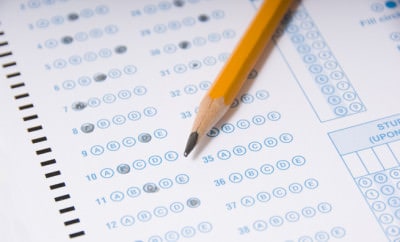

The recent study by the Council of the Great City Schools on standardized testing entitled “Student Testing in America’s Great City Schools: An Inventory and Preliminary Analysis” only solidified what most teachers have been saying for years: we are testing our students too much and its negative effects are very present here in North Carolina.
So conclusive are the findings of the study that even President Obama issued a statement this past Saturday that seems to be a complete reversal of the educational policies that he and the soon-to-be-former Secretary of Education Arne Duncan have championed. The President stated, “Learning is about so much more than just filling in the right bubble. So we’re going to work with states, school districts, teachers, and parents to make sure that we’re not obsessing about testing.”
The study states that an average of four instructional days out of 180 are spent in mandatory testing. That does not sound too steep, but what is not quantified in the study is all of the time in “teaching to the test” that teachers must perform in order to show compliance to the curriculum. Think of all the sample tests administered, practice tests made and given, and the ever present bubbling of answer sheets.
Simply put, our schools must waste valuable instructional time between students and teachers simply going through the process of testing.
Furthermore, the study does not take into account the time lost in the administration of mass tests. To assume that all students work at the same pace and that all schools are prepared with the resources to conduct testing (proctors, computers, network bandwidth, etc.), is erroneous. Simply put, our schools must waste valuable instructional time between students and teachers simply going through the process of testing.
Especially hard to fathom are when high school EOC’s and NC Finals are administered at the end of a semester in an exam schedule that easily lasts seven to ten days thus limiting student time with a particular teacher in a core subject.
The Council of the Great City Schools’ study also reveals a large disconnect between what is supposed to be taught and what is actually being tested. As reported in the Washington Post (“Study says standardized testing is overwhelming nation’s public schools”) the study concluded that “most schools are requiring too many tests of dubious value.” Standardized tests are largely written by for-profit entities and often are graded by contractors. To think that taxpayer money is being spent to not only buy tests but have them graded as well is disturbing. Even more disturbing is that the study reveals that many of these tests have little significance in measuring student growth.
Yet, what might be the most egregious consequence of what Michael Casserly (executive director of the Council) calls “an assessment system that’s not very intelligent and not coherent” is that it is used to measure school performance and teacher effectiveness.
North Carolina’s General Assembly adopted Jeb Bush’s stringent letter-grading system a couple of years ago that ranks schools mostly by student performance on standardized tests. If what the study says is true, then these performance grades are a gross misrepresentation of what many schools are doing to help our students.
And how many teachers have been falsely labeled as “underperforming” because of scores on standardized tests that are not completely valid? How many teachers of differently-abled and exceptional students have had to watch as the progress of those students gets minimized by standardized tests not meant for non-standard students? And how many times has the GOP-led General Assembly used those school performance grades and standardized tests scores to falsely legitimize the growth of Opportunity Grants to religious and private schools and the construction of charter schools, many of which do not have to administer the same standardized tests?
Sadly, those are not rhetorical questions. They deserve answers.
Imagine if teachers had more time for instructional purposes and had to worry less about teaching toward a test. Imagine if class sizes were smaller and teachers had more resources like time and energy to offer the individual students. Imagine if teachers were empowered to actually help create the assessments used to measure student growth and professional assessment and ultimately be treated like the professionals they trained to be.
The report ultimately focused on testing that mostly came about because of No Child Left Behind and Race to the Top. Ironically, before those results driven initiatives were implemented here in North Carolina, we arguably had the most progressive and enviable public school system in the South.
But now we have tested ourselves out of that distinction.


